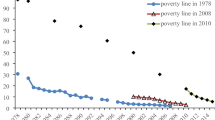Abstract
This paper explores how the behaviour of welfare, income inequality and poverty changes during the course of a country's economic development. the analysis is based on Kuznet's model of sectorial dualism. The various propositions proved in the paper provide conditions under which the modern sector enlargement and enrichment will lead to higher social welfare and lower income inequality and poverty. It is demonstrated that Kuznet'sU-shaped curve may not exist or even if it does, the turning point may occur at a later stage of development. The paper provides numerical illustrations of the results using Sri Lankan data.
Similar content being viewed by others
References
Adelman I, Morris CT (1973) Economic growth and social equity in developing countries, Stanford University Press. Stanford, CA
Ahluwalia MS (1974) Income inequality: some dimensions of the problems. In: Chenery H et al. (eds) Redistribution with growth. Oxford University Press, London
Ahluwalia MS (1976) Inequality, poverty and development. J Develop Econ 3: 307–342
Anand S, Ravi Kanbur SM (1984) The Kuznets press and the inequality-development relationship. Discussion Paper Series No. 249, Department of Economics, University of Essex
Anand S, Ravi Kanbur SM (1985) Poverty under the Kuznets process. Econ J 42–50
Atkinson AB (1970) On the measurement of inequality. J Econ Theory 2:244–263
Atkinson AB (1985) On measurement of poverty. Discussion paper No. 90, Economic and Social Research Council Programme
Bacha EL (1977) The Kuznets curve and beyond. Development Research Center, World Bank
Chenery HB, Syrquin M (1975) Patterns of development 1950–1970. Oxford University Press, New York
Clark SR, Hemming R, Ulph D (1981) On indices for poverty measurement. Econ J 91: 515–526
Edirisinghe N (1985) The food stamp program in Sri Lanka: costs, benefits and policy options. International Food Policy Research Institute, 1776 Massachusetts Avenue, N.W., Washington D.C.
Fei JCH, Ranis G (1964) Development of the labour surplus economy: theory and policy. Homewood
Fields, GS (1979) A welfare economic analysis of growth and distribution in the dual economy. Q J Econ
Foster JE, Green J, Thorbecke E (1984) A class of decomposable poverty measures. Econometrica 52: 761–776
Hadar J, Russell WR (1969) Rules for ordering uncertain prospects. Am Econ Rev 59: 25–34
Harris JR, Todaro M (1970) Migration, unemployment and development: a two sector analysis. Am Econ Rev 60: 126–143
Kakwani NC (1980) On a class of poverty measures. Econometrica 48: 437–446
Kakwani NC (1980) Income inequality and poverty: Methods of estimation and policy applications. Oxford University Press, New York
Kakwani NC (1981) Welfare measures: an international comparison. J Develop Econ 8: 21–45
Kakwani NC (1984) Welfare ranking of income distributions. Adv Econ 3: 191–213
Kakwani NC (1986) Analyzing redistribution policies: a study using Australian data. Cambridge University Press, New York
Kravis IB (1960) International differences in the distribution of income. Rev Econ Stat 42: 408–416
Kuznets S (1955) Economic growth and income inequality. Am Econ Rev 45: 1–28
Lewis WA (1954) Economic development with unlimited supplies of labour. Manchester School of Economic and Social Studies. Vol 22, May, pp 139–191
Oshima HT (1962) The international comparison of size distribution of family incomes with special reference to Asia. Rev Econ Stat 44: 439–445
Paukert F (1973) Income distribution at different levels of development: a survey of evidence. Int Labour Rev 108, No 2-3
Robinson S (1976) A note on theU-hypothesis relating income inequality and economic development. Am Econ Rev 66: 437–440
Saith A (1983) Development and distribution: a critique of the cross-countryU-hypothesis. J Develop Econ 13: 367–368
Sen A (1973) On economic inequality. Clarendon Press, Oxford
Sen A (1976) Poverty: an ordinal approach to measurement. Econometrica 44, No 2: 219–231
Shorrocks AF (1980) The class of additively decomposable inequality measures Econometrica 48, No 3: 613–626
Shorrocks AF (1983) Ranking income distributions. Economica
Theil H (1967) Economics and information theory, North-Holland, Amsterdam
Watts HW (1968) An economic definition of poverty. In: Moynihan D-P (ed) On understanding poverty. Basic Books, New York, pp 316–329
Author information
Authors and Affiliations
Additional information
This paper was written while I was a Senior Fellow at the World Institute for Development Economics Research, Helsinki, Finland. I am grateful to Juhani Holm for providing me with expert computational assistance. A referee of this Journal made some useful comments which led to considerable improvement in the paper.
Rights and permissions
About this article
Cite this article
Kakwani, N. Income inequality, welfare and poverty in a developing economy with applications to Sri Lanka. Soc Choice Welfare 5, 199–222 (1988). https://doi.org/10.1007/BF00735761
Received:
Accepted:
Issue Date:
DOI: https://doi.org/10.1007/BF00735761




